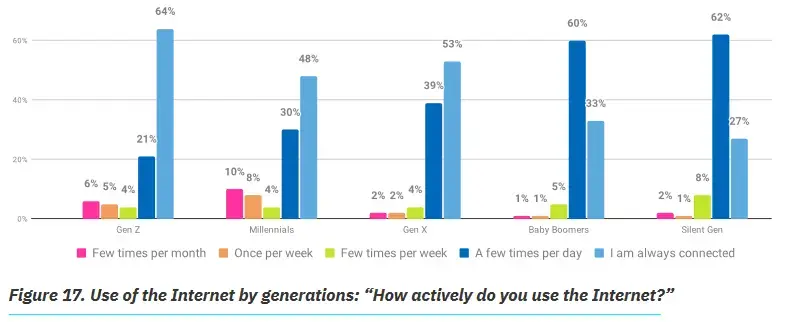Hm, like most opinion pieces, there aren’t any hard numbers from studies really shown besides the initial percentages. And I immediately picked up on the second paragraph’s
Compared to older generations, younger generations have reported higher rates of victimization in phishing, identity theft, romance scams, and cyberbullying.
Yeah no shit those metrics will skew towards Gen Z being more victimized if you’re lumping cyberbullying into the mix! They’re one of the first generations that have had to deal with their peers harassing the everloving shit out of them all hours of the day online. As a millennial, I didn’t have to even think about putting up with that until at least high school. I’d really want to see what questionnaire wording they were using for the survey data. If the question was legitimately “Have you ever been a victim of phishing, identity theft, romance scams, or cyberbullying?” then I think almost everyone with a social media account for their whole life would need to check “yes.”
Self reporting is also notoriously unreliable
I also wonder if they controlled for the fact younger people are online more often in the first place.
Yeah no shit those metrics will skew towards Gen Z being more victimized if you’re lumping cyberbullying into the mix!
They’re high in each of those categories individually, not (just) if you add the categories together and compare the totals. Millennials are slightly higher in Romance scams and identify theft though.
BUT these numbers are also self-disclosed. I’m not sure how you’d correct for this in a survey, but I could easily believe that these two generations are simply more likely to realize they’ve been victimized, and have a higher exposure to the internet (and thus to scams).
I’d be more interested in something like a sit-down test, to be honest. It’d be easier to account for time spent online and self-awareness of victimization, and more likely to isolate “internet street smarts”, as far as I can tell.
Considering what the boomers and Gen x have put the millennials through, I’m not surprised they’re susceptible to romance scams.
We just want to be loved.
Also worth considering with self-report that Gen Z may just be more open about their failings
Stupid article, most of Gen Z aren’t even 21 yet, of course they’re gonna fall for scams, they’re teenagers or younger lol. I got scammed loads of times on RuneScape as a kid, and that taught me better than anything else how to avoid scams.
Considering that Gen Z is usually defined as being born between the mid-late 1990s and early 2010s, I wouldn’t support the first half of that statement. Everyone born in the first half of 2005 or earlier are 18, making them adults, so about half of Gen Z is adults.
Now whether this article uses that age range properly or whether it’s just someone using the term to mean “young people”, I have no idea.
But the premise of the article that just because someone uses technology all day makes them somehow invulnerable to scams (something that has absolutely nothing to do with how much someone uses tech) was ludicrous from the start.
The US census used 1997 - 2013 as the range. Which gives us an age range of 10-26, making the median age 18 - and I was thinking of 21 as adult, rather than 18 - which is why I said “they’re teenagers or younger” - but yes, you’re right, “only” 40%-ish of gen Z are under 18 :p
Run the same survey again in 11 years and compare 21+ gen Z to 2023’s boomers and I bet the results aren’t even close.
You cannot determine median based on range alone. You basically need to know how your datapoints (people in this case) are distributed to be able to actually calculate the median, because the 50th percentile does not have to lie smack in the middle between the extreme ends of your range.
Sure you can, it’s just the median of the range rather than the median person. For what it’s worth, I did look at age distribution statistics and there is some disparity but it’s minimal, which is why I wrote 40% instead of 44%.
Anyways, this is getting much too pedantic, obviously I’m not writing a scientific analysis, it’s just an internet comment, it doesn’t need to be perfect.
I got scammed by Columbia House when I was a teenager.
Oof. Brings back the memories.
Though it was expensive, my Time Life 80s Music series (CD) was worth it and I still have em all. Thankfully, it wasn’t hard to cancel once I realized I was getting redundant stuff and they would never stop sending CDs as long as I kept paying.
Buying gf
“Gen Z simply uses technology more than any other generation and is therefore more likely to be scammed via that technology.”
That’s part of it for sure, but anecdotally I also find that Gen Z people often have quite a shallow, even naive understanding of the technology they use every day. Probably due to modern interaction design valuing simplicity above everything else.
I think that’s true of any technology that goes mainstream. New tech is evolved to where the end user doesn’t need to know how it works to use it.
Click this link for discord nitro free!
I’m so used to seeing damned bots spamming that everywhere, my half asleep ass immediately reached for the report button lol. It’s just instinct now. Pavlov’s Discord Nitro.
😮 Where’s the link? I don’t use Discord but I like free /s
Anything is free if you just grab it and walk away!
@admin this is a result of the enshittification of technology. You’re no longer forced to learn, you’re only displayed a button that you need to press. Doesn’t matter what will the button do behind, just blindly trust that it does what it says it does.
I have to say that learning how to pick out the actual download button from all the other “download” buttons is one of the most crucial steps in making yourself resistant to online scams.
Really, yeah, people today use computers on more than an hourly basis. But that doesn’t automatically make someone more technologically literate. It’s no longer a hard requirement to understand how a computer (I’m lumping smartphones, PCs, Macs, etc.) works in order to do useful operations with it.
Install our software! Just pipe a curl download of some random script into a root shell, it’ll be fine.
lol I got trolled by that once. Luckily they just did rm -rf / instead of hacking me.
@Bitrot scams no longer mean malware anymore. Phishing is also a thing for example. And hiding full URLs from a browser’s bar doesn’t help with this either
That’s not enshittification it is a normal progression of tech to make it useful for a wider audience. Otherwise we would be typing a byte at a time with front panel toggle switches like on a PDP-8.
This seems needlessly gatekeepy to me. Are you saying everyone using technology needs to learn exactly how it all works? People aren’t allowed to just use the tools provided to them? Like are cameras worse now that you can just point and shoot vs having to go through many steps for the photo to maybe turn out ok?
@chloyster I’m sorry if I sound so. No, I do not mean to get into the technicalities of the stuff. What I meant was the fact that technology needs to be a bit more transparent about what is doing, and to have companies stop trying to hide stuff just for the sake of a better user experience. We just need to educate more people into using technology, rather than trying to make it more accessible by sacrificing some power user features and capabilities.
It’s the same like knowing some basic economics to understand things like ponzi schemes or other types of scams (or simply being able to save more money).
I see what you’re saying. I do agree that people should have the opportunity to be educated to at least a baseline understanding of some things. If for nothing else but to avoid being scammed.
I mean ideally I would just like these companies to be held responsible for doing shady stuff behind the scenes, I don’t think having easy to understand UIs (and as a result, a bit obfuscated from what’s actually happening) and such have to be a bad thing. But maybe it’s too idealistic to want that and expect companies to actually be held accountable if the obfuscation is hiding bad stuff
I worked in fraud until it broke my soul. Yeah I believe it. The amount of young adults that fall for Facebook scams especially is pretty staggering.
deleted by creator
I’ve no idea what’s going on in this entire thread
A bunch of my millennial peers acting like their boomer parents with “kids these days” and “back in my dad we had common sense!” takes despite promising themselves for decades they’d have at least a tiny bit more humility than the aforementioned overly judgmental parents.
🤖 I’m a bot that provides automatic summaries for articles:
Click here to see the summary
“People that are digital natives for the most part, they’re aware of these things,” says Scott Debb, an associate professor of psychology at Norfolk State University who has studied the cybersecurity habits of younger Americans.
In one 2020 study published in the International Journal of Cybersecurity Intelligence and Cybercrime, Debb and a team of researchers compared the self-reported online safety behaviors of millennials and Gen Z, the two “digitally native” generations.
But because Gen Z relies on technology more often, on more devices, and in more aspects of their lives, there might just be more opportunities for them to encounter a bogus email or unreliable shop, says Tanneasha Gordon, a principal at Deloitte who leads the company’s data & digital trust business.
Staying safer online could involve switching browsers, enabling different settings in the apps you use, or changing how you store passwords, she noted.
Gordon floated the idea of major social media platforms sending out test phishing emails — the kind that you might get from your employer, as a tool to check your own vulnerabilities — which lead users who fall for the trap toward some educational resources.
But really, Guru says, the key to getting Gen Z better prepared for a world full of online scams might be found in helping younger people understand the systems that incentivize them to exist in the first place.
Saved 83% of original text.
Crypto moment
Surveys are really interesting in that, they often find things that are quite strange, and you are left wondering who was included and who wasn’t. For example, I found it kind of surprising that gen z and millennials are way more often to ‘touch grass’ than the older generations

but it may make sense in the context of who actually got polled - I know I wouldn’t bother to fill out an online poll or one that I received in the mail without compensation, and I suspect a decent amount of disconnected individuals would feel similarly. It was an online survey, so it’s not too surprising that they caught people who are connected to the internet, but its kind of surprising they found people who are rarely online.
This is a very insightful and informed take. TBH, I did NOT do my due diligence of critical thinking before posting this article. I’ve succumbed to knee jerk reactions once again.
And Windows is a huge red flag for this. Literally two OS’s working at the same time make it a shit product. One OS for legacy users who know what cmd and control panel are and the new junk system where they want to circumvent the first OS and slither all of your information to their shit tier One Drive. One Drive is iCloud without security.
Absolutely garbage and cannot wait to feel confident in a dual boot or just straight Linux because this is just stupid tech making people helpless and hamstringing them as per usual.
Removed by mod
















